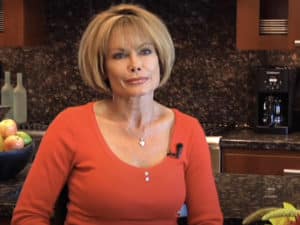Jennifer Dorian: GM of TCM & FilmStruck + EVP of 360 Brand Strategy for Turner


Jennifer Dorian
Title: GM of TCM & FilmStruck + EVP of 360 Brand Strategy for Turner
Industry: Entertainment
Jennifer Dorian went to high school in Atlanta, attended Emory University, and when she finished her undergrad, she went out to the University of Texas at Austin, for graduate school. She found herself taking a job at Pizza Hut in new product development, which she really enjoyed because she got to work on the whole process from consumer insight to concept, to prototypes and researching, test markets, and national rollouts. She did that for four years, and she always felt grateful that she got that chance to work in research, and product development.
From there, Jennifer went to work at Coco-Cola in sports and leisure marketing, where she wound up doing a lot of research for the US domestic brand on what sports and leisure activities fit in with what soft drinks and sports drinks. That’s where she first got a buzz for the entertainment industry. She got to study every type of leisure activity up close and personal for four years and do research in amphitheaters, hockey arenas, festivals, movie theaters, and even the Olympics.
All of this experience made Jennifer really interested in the entertainment industry. And when Steve Koonin, her boss at Coke, moved over to Turner, he was brought in to revitalize TNT, it was 2000 and TNT and TBS were starting to have just slightly flagging results (because cable had populated with hundreds of channels). It was Steve’s job to come up with how to position TNT for the future, so he called Jennifer, and he said, “I know you’ve done a lot of research and brand consulting, I think you could work on this business.”
Jennifer took the job as Vice President of TNT Brand Development, and she led a study on what genres, or appeal, or focus TNT might leverage. She discovered that people actually had a genre preference.
“In the old days, when you walked into a video store, you would navigate yourself towards, “Oh, I’m in the mood for a comedy, or I’m in the mood for a drama, or a foreign film.” And TNT people were already really into drama, so I was able to lead our initiative with We Know Drama, for TNT back in the year 2001.” Jennifer explained. “It was really successful for about a decade.”
During that time, Steve and Jennifer were able to work on different brands including TBS Superstation turning into TBS Very Funny, and Court TV changing to truTV, and Jennifer did a lot of strategic planning for the brand. Once everything seemed to be in a good place, she said to Steve that he’d like to work in more general strategic planning – thinking about their priorities and how they could be better, what new businesses they should get into as well as innovation.
That shift led to Turner Classic Movies, working on a lifestyle extension business with cruises and festivals, wine clubs, etc. And when management had a reorganization in 2015, Jennifer wound up becoming the general manager for Turner Classic Movies
“I was such an advocate for fandom, and for the TCM fans who love classic film and love TCM. Because it’s been a trusted brand for over 24 years, being commercial-free, taking good care of curating the classics.” Jennifer explained. “I was just proud to work on a brand that had so much fan value.”
Learn more about Jennifer Dorian in our interview with her below.
With the different kind of initiatives that you do at TCM, can you talk about the strategy behind that and what you guys are doing with the Trailblazing Women in Film and the other ones that you have coming up? Where those start from, and whether or not you decide to continue to do them in future years?
That’s a great question. At Turner Classic Movies we are always thinking about how to serve classic movie fans, and we actually had a really cool insight about two years ago, that TCM’s doing a great job of classic Hollywood, it’s a great destination, but the movie lovers still don’t have a home for foreign films, independent films, art-house films. So we saw an opportunity to learn in the streaming video on-demand space, that we could offer something. Like a movie service like Netflix, but for film lovers.
So we launched FilmStruck about a year ago, and that’s been a real learning curve for us at Turner, it was our first domestic subscription video on-demand service. It’s been wonderful to interact directly with the fans, the subscribers of FilmStruck, and to program, but yet leverage the programming and curation capabilities that TCM has. I work with 80 of the biggest film fans you have ever met, I mean really, I will never win a trivia game. About 2/3 of our staff have advanced degrees in film studies, and have run film festivals. Anyway, they’re the perfect people to curate an art-house movie service through FilmStruck, and to curate what you just brought up, special themes and events on Turner Classic Movies.
Our head of programming Charlie Tavish has always thought of interesting, introspective, thoughtful, detailed, and topical themes that people would care about in the modern world. You don’t just want to program movies randomly; you want to give them context and topical reasoning. So he came up with the idea in 2015, of focusing on trailblazing women in films who made a difference for all these many decades, 10 decades. And I was the new general manager at the time, and I said, “Wow, this is a big idea, what if we did it for multiple years so that we could make it into more of an evergreen focus?”
And it was really important to look outside ourselves, we were able to schedule the movies, but we wanted to partner with a pro-social organization that knew more about the struggle that gender equality in making films, and that we partnered with Women In Film. That’s been a really great partnership, because they have current programs about how women filmmakers can get more information, how they can get training, how you can watch #52filmsbywomen, that’s a really fine pro-social Twitter campaign.
So we’ve been with them since the very first year, and I think it’s nice that they shine a light on the contemporary issue, while we provide the inspiration and backstory of women who really have made such huge contributions to the history of film.
You can see that in the programming even for this October, where we’re looking at classic films, whether all the way from the silents, or older films like Ben Hur, all the way up to contemporary titles. But we have people working in the industry today commenting on it, and I understand you came over to our shoot, and met the screenwriters, producers, editors, who are working in today’s contemporary Hollywood.
What was really amazing about that is just how honest their conversations were about their journeys. It’s just not a conversation you hear, so it’s really great that TCM is highlighting that, and having an initiative built around that.
It’s crazy that today, one out of every ten directors is a woman, one out of every eight screenwriters is a woman, it’s not an equitable situation for voices, storytelling. To bring up these incredible women in the past who, not only did they make contributions, but they sometimes helped to disrupt the system, and make Hollywood a better place.
What does your day to day look like, you’re working with TCM and FilmStruck, but you’re also doing, working on the brand strategy. What all does your job involve?
These days I’m really focused as general manager of TCM, on getting support and resources for our network to reach the most people, with the best programming. The people who report to me are in charge of creative, and programming, and marketing, so I’m very much doing the PowerPoint, the Excel, making business decisions to help get resources to the highest use. There’s some talking to cable operators and distributors, helping drive awareness towards our events, a lot of thinking about …
When I am in the mode of strategy, it’s usually about how can we create new experiences for our fans, what can we take out to the market, what can we sell on eCommerce, what books could we be publishing with partners, things like that. Extensions, lifestyle extensions so we can help people. People want to, that are really into classic films, they want to more than just watch the movies, they want to talk about the movies, live the movies, share the movies, travel with the movies. That’s been really fun for TCM to think about how to be a part of people’s travel and home.
That’s the really beautiful thing about fandom, is you have people that otherwise wouldn’t necessarily have anything to talk about, or to come together over, but if they love the same movie or the same TV show, it’s like they have this unspoken bond, now they’re connected because of this medium.
Yeah, totally. I have to say, we’ve got really cute, a plethora of stories of people meeting at our event, and getting married, and having babies. We’re producing the next generation of film lovers as well. Just like you said, like-minded people getting together and clicking right off the bat. Because of my work at Turner Classic Movies, I’ve been working on a broader project at Turner, that we named 360 Degree Fandom Strategies, just like you said. How do you recognize fandoms, and then offer services and products in a whole 360 degree fashion that address their needs in every facet of their life.
Whether it’s having social currency, getting together with people, having special experiences. Or projecting your identity through your accessories, and your fashion, and in your home décor. Or consuming content in new ways, books, comic books, games. We want to try to feed the fans need all the way around. So the fan base across Turner that we’re just excited to think about serving more, could be via brand, or it could be via personality, or television show, or even a subject matter, like being a health nut, something that’s brand neutral, but the fan is at the center. A news junkie, a health nut, a sports fan.
Working with fandoms, is that your favorite part of what you do? Hearing these stories from fans? At the core of fandom you have people that are looking for some sort of escape from their regular routine into a world of fantasy, regardless of genre. Is that your favorite part of what you do, seeing that joy and happiness? Seeing people be brought together?
I would definitely, that’s a good insight. It’s the most magical thing that happens for all of us, all year, is going to our Turner Classic Movies Classic Film Festival, in classic Hollywood, every April or Spring. And you meet people who live, eat, sleep, and breathe classic film and TCM. And to your point, they are there to bond and meet with one another, to see 15 movies in a weekend, to dress up, to go to a gala on a red carpet and dress up in vintage clothing, and talk about their favorite film or genre.
Actually, that’s probably the most fun, to meet people and hear their incredible stories, how far they came. I’m holding right now in my hand, a little ring someone made, that looks exactly like our festival logo, and it’s a vintage ring that belonged to her grandmother, and she gave it to me. She didn’t; it was just a totally quick, casual, “Oh, doesn’t this ring look exactly like your festival logo? I want you to have it. Thank you for making this festival possible, and a special gathering every year.” I keep in it my office, and I think about it, because it’s just such a cool example of the appreciation for the community, and for the network, that fans have.
What’s the biggest challenge that you face in your job?
I think prioritization because you can’t do it all. For example, curating the history of all movies, that’s a lot to work with. We could every single day, and we do, we have a special theme on our air and an on-air festival if you will, every single day. But we have to pick and choose, which ones we’re gonna have extra shoots, and fly in talent, and have marketing priorities, and PR to spread the word. So I think prioritization of our … What is that expression when you have a treasure trove of assets? It’s the burden of so many wonderful treasures. So prioritizing.
Another big challenge is, how do we, we’ve grown a classic film fandom over 24 years on TCM, and one of the reasons that has happened, is by being commercial free, so important. Because we’re showing the movies uncut, as the way they were meant to be seen, uncut and commercial free, and we get a lot of fan love for that. But we want to do the same community growth and fandom on FilmStruck, so that’s a challenge that we need to constantly, how do we get the word out.
It’s funny, once people discover, if they really are film fans, once they learn about FilmStruck they’re very satisfied and happy with it, they’re kind of blown away like, “Oh, this exists? And it’s not a nonprofit?” They’re like, “Wow, this is a really cool commercial entity,” with such a noble mission to show the best films from around the world. But getting the word out has been, it’s hard, there’s a lot of clutter in the media space.
How do you try to combat that with Netflix, and Amazon Prime, and all of these other services that are trying to compete for that?
It’s no secret, we see a blank space in the market right now, because Netflix, and Amazon and Hulu, are very focused on original series. They seem to be spending less money on their movie library, so we see opportunities to build a destination for movie lovers, where it’s a place that only curates films. And it’s hard to find quality films put together in one place, like FilmStruck. We think that we have a good, unique concept, and to your point, how do we get the word out, we lean heavily on public relations. We do have marketing, we do have word of mouth, and social, but right now it’s about driving awareness and trial and sampling.
If you were given three more hours in a day, how would you use them?
Personally, I know I would want to read a book. I tend to read books in the middle of the night, because I’m a slight insomniac. I fall asleep, but then I wake up. I read a lot of books. In fact, today someone told me about an app called Blinkist, and it summarizes nonfiction books, and I’m gonna try that for fun, to get even more books when I’m driving to work or something. I love podcasts, as well.
Then you know what I really crave, is the chance to just sit down with the staff at TCM, and have more free floating conversations. You’re always running to a scheduled, structured meeting, and I would love to just sit down with several of the people we work with, and just pick their brains, what’s going on, have more exploratory time.
What advice would you offer to others that are looking to pursue a similar career path to yours – brand strategy in the entertainment space?
I guess my advice would be, it’s always really constructive to have experience with consumer research, because it’s so foundational to understand how to learn about the motivators of people and fans. To think about concept development and how you’re gonna test out your concepts. I just got really lucky that my first job with Pizza Hut focused on new product development, because I think I’ve been basically replicating new product development in every job since then. Good listening, good imagination, good concept testing. Just over and over again.
And I have to ask, with you being at Turner Classic Movies – what is your favorite movie?
I have so many, I’ll tell you a movie that always surprises me how much I love it, and no one else really does, but “Norma Rae” with Sally Field. I guess I saw it when I was like 12 years old, and it’s such a feminist, first of all it’s such an altruistic story of someone who unionizes a bunch of exploited people. The fact that she’s a working mom in a traditional culture, and living such a nontraditional life. Her persona bravery, I just love that movie. And I have actually seen it at the Turner Classic Movies Classic Film Festival, so that was fun. An actual union organizer, who created the true story, was there to introduce the movie, you only get that from TCM.
Another experience I’ve had working here that blew my mind, was “Passion of Joan of Arc,” it’s a silent film, it’s 80 minutes long, I can’t imagine I would have run into it really being a Coca-Cola sports and leisure executive. When I saw it at our festival, with its symphony and a choir, it was one of the most moving movie experiences I’ve ever had. Those are two unique experiences I’ve had being at Turner Classic Movies.
Want to keep up with Jennifer Dorian? You can follow her online on Twitter at @JRDorian, and be sure to check out FilmStruck and TCM for all your classic movie needs!
Emily Sprinkle, also known as Emma Loggins, is a designer, marketer, blogger, and speaker. She is the Editor-In-Chief for Women's Business Daily where she pulls from her experience as the CEO and Director of Strategy for Excite Creative Studios, where she specializes in web development, UI/UX design, social media marketing, and overall strategy for her clients.
Emily has also written for CNN, Autotrader, The Guardian, and is also the Editor-In-Chief for the geek lifestyle site FanBolt.com








Responses